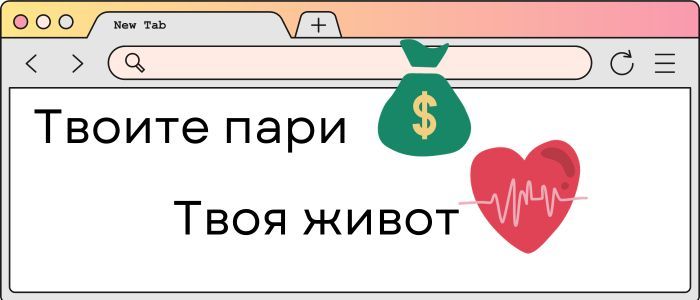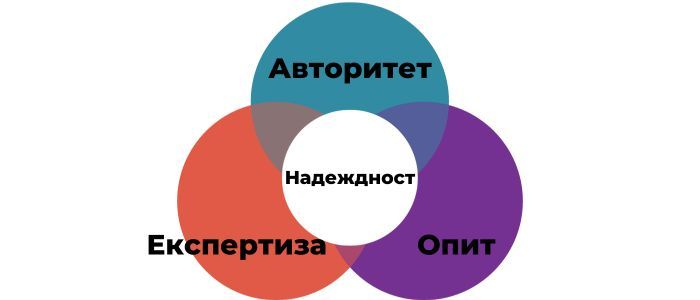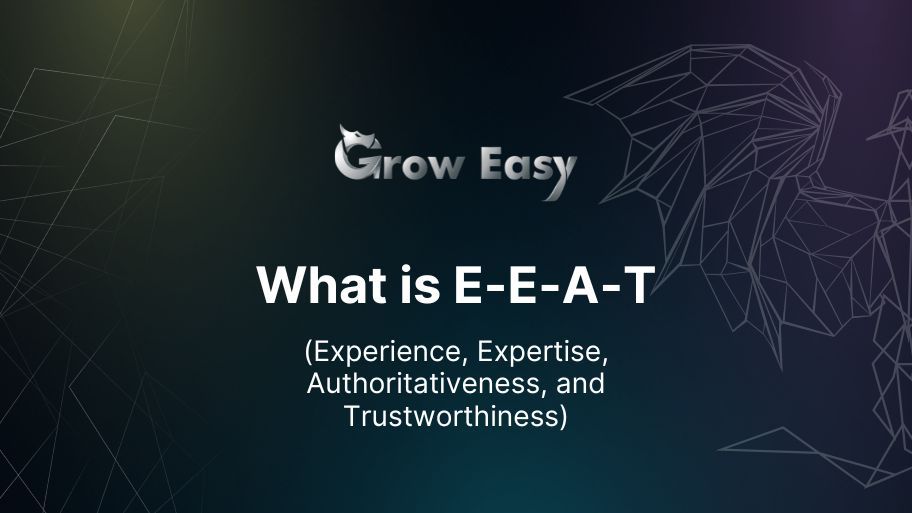You may be wondering, what is E-E-A-T and what will I read about in this article? Let us explain with an example. Have you ever looked at the content of a website and thought:
I am not sure I can trust this. Who wrote it? Why should I believe a word of what they say?
We know this happens to you because, as online users, we all look for meaningful content and are often disappointed. We don't need unnecessary information; we want to learn something new and interesting. That's why in this article on Grow Easy, we'll give you what you need and share practical tips for improving your website's SEO through E-E-A-T.
What is E-E-A-T and what is Google's basic concept for evaluating search quality?
The acronym E-E-A-T stands for Experience, Authority, Credibility, and Reliability. In plain language, these are a set of signals that Google uses to evaluate and assess content. It is most commonly used on pages containing information that affects your life and finances, such as financial or medical information.
The Google team is constantly battling good and bad content because they know that users don't want to encounter misleading content.
Today, artificial intelligences such as ChatGPT, Bing Chat, and Google Bard are producing more content than ever before. This has led to an increase in fast-moving and inaccurate information on the internet. In a world where people are spending more and more time online, there is a growing need for monitoring to identify quality information.
Google is working hard to train its systems to recognize and reward high-quality, expertly written, factual content—this is where E-E-A-T comes in. It's the perfect starting point for SEO.
You don't need to read the entire Google Search Quality Rater Guidelines to know that experience, expertise, authority, and trustworthiness are mentioned repeatedly. (If you want to, you can find it here. These basic signals help Google refine its quality control algorithms. Of course, they don't show you exactly how the ranking algorithm works, but they are still a key element.
Experience shows that E-E-A-T is not used with equal strength and influence for every search, even though Google has officially stated that it considers E-E-A-T for every query.
As you learned earlier, E-E-A-T is particularly important for web content that describes things that can affect visitors' lives. These are the so-called YMYL (Your Money or Your Life) sites.

What are YMYL websites?
YMYL is an abbreviation for Your Money or Your Life. These pages contain information that affects your money or your life.
Here are some examples Google gives for YMYL:
- News and current events,
- Civic education, government, and law,
- Finance,
- Shopping,
- Health and safety,
- And much more information or decisions that can affect a person's life or finances.
Such pages may affect the well-being, health, financial situation, or safety of visitors. As you can see, this area is very broad and affects many websites. Thus, even accepting credit cards for online purchases turns your website into a YMYL.
Since the content of these sites can have an impact on people's lives, it must be evaluated with extreme care. Google identifies them as YMYL because they require additional verification.
In the age of artificial intelligence, fake news and misinformation are increasingly difficult to detect and critically distinguish. For example, during the COVID-19 pandemic, Google fought hard to prevent misinformation about the virus from appearing in search results.
To this end, the search engine uses various signals to determine the reliability of a website. In addition, it has search ranking systems that evaluate the experience, expertise, and authority of so-called experts. These signals help Google better understand which sites to rank and which to sweep under the rug.

What does E-E-A-T mean?
As we mentioned earlier, E-E-A-T stands for Experience, Expertise, Authoritativeness, and Trustworthiness. Google uses these quality criteria to evaluate the reliability and relevance of web pages and websites. This plays an extremely important role in building a successful Search Engine Optimization (https://groweasyltd.com/search-engine-optimization) strategy.
Google states that E-E-A-T is particularly important for "Your Money or Your Life" content, as it can have a significant impact on the well-being and safety of consumers.
These criteria are interrelated and are used to evaluate the effectiveness of a given website. Websites with good O-E-A-N can appear in any sector and industry—it is not limited to those with YMYL content.
Experience
In December 2022, Google added an extra E to the acronym to form E-E-A-T. The additional letter signals an increased focus on experience – do authors have real, direct, or practical experience in the field they are writing about?
Pages created by individuals with rich personal/professional experience are usually reliable and effective in achieving their goals.
An example of this is when you consider whether to trust a product review from someone who has personally used the product or similar content from someone who has not.
More on experience versus expertise The difference between experience and expertise is often small, and Google uses both terms interchangeably in different situations.

What is E-E-A-T: Expertise
Was the article you are reading written by an expert? Can you find out anything about them? Are they successful in their field, have they won any awards, do they have the support of other professionals?
Are you wondering whether the article on mortgage loans was written by an experienced financial advisor specializing in residential property financing, or by a content marketer looking to get links? For many topics, this matters.
For content on the topic of YMYL, expert experience is important. People who read it need to know that they can trust the expert experience of the person who wrote it.
For content that is not YMYL, Google also uses real-life experience to signal that the authors are considered experts in their field. The author's expertise is assessed at the level of the content itself.

Authority
When determining authorship, Google takes into account the author, content, and website. Are you and your website authorities in the field? It all depends on who you are, who you represent, and what your online reputation is.
Experts in a given niche are rated much higher by Google and therefore rank at the top of search results. The algorithm highly values websites whose content meets the needs of visitors and offers quality information and services. Of course, high rankings don't happen quickly; your website and domain need to gain popularity and reputation. However, there are rarely used SEO techniques that will help you reach the first page quickly and smoothly.

What is E-E-A-T: Trustworthiness
Trust is the cornerstone of the system and the most important component of E-E-A-T.
Trust is at the heart of Google's E-E-A-T system. By following Google's E-E-A-T guidelines, you can successfully build the trust that quality criteria strive for. For reliability, Google also takes into account the author, content, and website.
Google uses many signals to determine the security of your site. This can be as simple as technical reliability—do you have an SSL certificate?—to more abstract signals such as online discussions about your business or how you respond to online reviews.
The best way to make your site more reliable and secure is to answer the following two questions: "Why would people spend time on my site?" and "Can my business be trusted, and how do I prove it?"

What is E-E-A-T and is it a factor for SEO?
Many discussions debate whether E-E-A-T is a ranking factor, but there is no clear answer. This is a concept that every website should follow when creating quality content. This quality content will attract the right audience, so Google will start to consider you an authority on the topic. However, don't forget that there are many different signals and ranking systems, so make the right SEO strategy, or contact professionals with proven experience.
Working on your E-E-A-T is beneficial because you are working to improve your expertise, authority, and trustworthiness in the eyes of your customers. And that's what every business should be doing, right? But that shouldn't take away from your technical SEO work.
Review Google's quality rating guidelines to see what they are looking for in search results. Keep in mind that it doesn't describe how the algorithm works, so you don't have to follow it religiously. Just make the best website you can. Make sure your content is top-notch and backed up by experts if needed.

How can you improve E-E-A-T?
As you can imagine, E-E-A-T does not have a clear definition, and there are no optimization manuals. It is part of Google's overall algorithm, and you should mainly be guided by the experience of SEO experts who have encountered this before. The most important thing is to focus on quality content. It is one of the main signals that help Google rank your site higher.
SEO applies to all sites, but if you have a site with YMYL, you need to be especially careful. The results of these improvements will not be visible immediately, but by gradually building up your content, you will rise above the competition.
There are steps you can take to improve your E-E-A-T. We have selected a few for you, depending on the type of content you have:
- Create only quality content, according to your website's niche.
- Do not publish false information.
- Define WHO is the author of the article. Write a few words in a virtual business card.
- Join Google Business so your customers know you are a real business.
- Optimize your website and increase its loading speed. If it takes more than 3 seconds, you are losing traffic.
- Build an easy-to-use and navigate user interface.
- Create a website that is mobile-friendly.
- Guarantee absolute security for visitors.
It is impossible to list all successful practices in one article. Follow the steps to build comprehensive SEO optimization and supplement it with the creation of quality content. This way, you will prove to Google that you have Experience, Expertise, Authority, and Reliability.
What is E-E-A-T and what role does it play in distinguishing facts from fiction?
In this article, we introduced you to a term you may not have heard before, namely SEO: E-E-A-T Experience, Expertise, Authority, and Reliability. It is key to identifying your quality, online content, and business. E-E-A-T is a key concept that gives you an idea of what is important for Google to recognize the quality and expertise of your website.
When creating content, it's easy to forget that you're not just doing it for Google. Your customers expect high-quality content and services. This is entirely to your advantage, as satisfied customers are more likely to contact you for a quote or shop at your online store. Implement the E-E-A-T concept in your SEO strategy, add Google Ads to reach a larger target audience, and in no time you will be one of the top results in the search engine.
If this article has helped you rethink your SEO strategy or simply provided you with new and interesting information, you can find more about optimizing your online presence on our blog (https://groweasyltd.com/blog).
